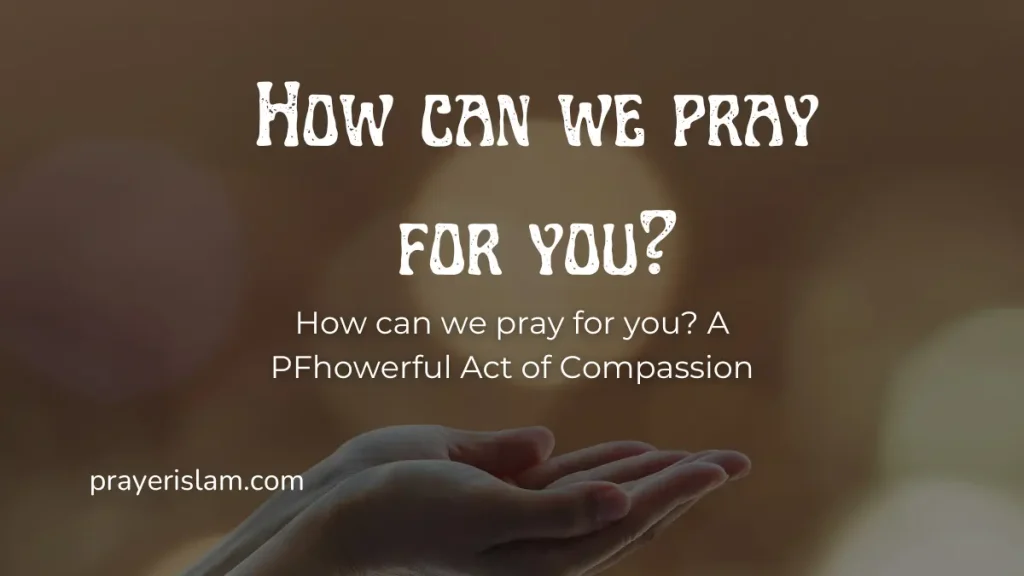Prayer is a universal practice found in various forms across cultures and religions. It is a deeply personal act of communication with a higher power, a way to seek guidance, solace, and connection. While many people pray for their own needs and concerns, praying for others is a profound expression of empathy and compassion. In this article, we’ll explore the significance of praying for others and how it can positively impact both the person praying and the recipient.
How can we pray for you meaning
When someone asks, How can we pray for you to god? they are expressing a willingness to intercede on your behalf in their prayers. It means they want to support you spiritually by bringing your needs, concerns, or desires before their chosen deity or spiritual figure.
This act of asking how they can pray for you signifies their care, empathy, and desire to offer you comfort, guidance, or assistance through their prayers. It’s an expression of solidarity and support in times of need or difficulty
The Essence of Intercessory Prayer
Intercessory prayer, the act of praying for others, is rooted in the belief that our prayers can make a difference in the lives of those we pray for.
It involves lifting up the needs, hopes, and struggles of others to a higher power, asking for divine intervention or assistance on their behalf.
This selfless act of reaching out to others in prayer reflects a deep sense of empathy and interconnectedness.
Understanding the Power of Collective Prayer
There is a unique power in collective prayer, where multiple individuals come together to pray for a common cause or intention.
Whether it’s a small group gathering or a global prayer initiative, the combined energy and intention of many people praying simultaneously can create a palpable sense of unity and solidarity.
Collective prayer amplifies the intention behind each individual prayer, creating a ripple effect of positive energy and blessings.

Benefits of Praying for Others
Praying for others not only benefits the recipients but also brings numerous rewards to the one who prays. It cultivates a sense of empathy, compassion, and altruism, fostering a deeper connection to humanity.
Moreover, studies have shown that engaging in acts of altruism, such as intercessory prayer, can have positive effects on mental and emotional well-being, reducing stress and promoting a sense of purpose and fulfillment.
Cultivating Empathy and Compassion
Prayer for others is a powerful tool for cultivating empathy and compassion. By intentionally focusing on the needs and struggles of others, we broaden our perspective beyond our own concerns and develop a greater capacity for understanding and empathy. This practice fosters a sense of solidarity with those who are suffering, motivating us to take action and offer support in tangible ways beyond prayer.
Strengthening Relationships and Community
Praying for others strengthens the bonds of relationships and fosters a sense of community and belonging. When we pray for friends, family members, or even strangers, we are expressing our care and concern for their well-being. This act of kindness and solidarity can deepen existing relationships and create new connections based on shared values and intentions.
Practical Tips for Effective Intercessory Prayer
While the act of praying for others is deeply personal and intuitive, there are some practical tips that can enhance its effectiveness:
- Set aside dedicated time for intercessory prayer each day.
- Create a prayer list or journal to keep track of the names and needs of those you are praying for.
- Be specific in your prayers, addressing the specific needs and concerns of each individual.
- Pray with faith and conviction, trusting in the power of divine intervention.
- Practice gratitude for the opportunity to pray for others and the blessings in your own life.
Overcoming Challenges in Intercessory Prayer
Despite its benefits, intercessory prayer can also present challenges and questions. For example, some may struggle with feelings of doubt or inadequacy, wondering if their prayers truly make a difference.
Others may grapple with the ethical implications of praying for certain outcomes, especially when there are conflicting interests involved. It’s important to acknowledge these challenges and approach intercessory prayer with humility, openness, and a willingness to grapple with difficult questions.
The Spiritual Dimension of Intercessory Prayer
Intercessory prayer is not just a psychological or emotional exercise; it is also a deeply spiritual practice that transcends individual boundaries and connects us to something greater than ourselves.
It is an act of surrender, humility, and faith, acknowledging our dependence on a higher power and trusting in its wisdom and grace. Through intercessory prayer, we participate in the divine work of healing, restoration, and redemption in the world.
How can we pray for your response
If someone asks, “How can we pray for you?” you could respond in various ways depending on your current situation and needs. Here are a few possible responses:
- “Thank you for asking. Right now, I’m facing some challenges at work, so prayers for wisdom and guidance would be appreciated.”
- “I’ve been feeling overwhelmed with stress lately, so prayers for peace and clarity of mind would mean a lot to me.”
- “My family is going through a tough time with a loved one’s illness, so prayers for healing and strength for all of us would be deeply appreciated.”
- “I’m embarking on a new chapter in my life, so prayers for courage and resilience as I navigate this transition would be very helpful.”
- “I’m struggling with a decision and could use some clarity, so prayers for discernment would be wonderful.”
A List for Prayer
- Health and Wellness: Pray for my physical, emotional, and mental well-being. Ask for strength, healing, and resilience in facing any health challenges or struggles I may be experiencing.
- Personal Growth and Development: Pray for guidance and wisdom as I navigate through life’s decisions and challenges. Ask for clarity of mind and opportunities for personal growth and self-improvement.
- Relationships: Pray for harmony, understanding, and mutual respect in my relationships with family, friends, and colleagues. Ask for healing and reconciliation in any strained or broken relationships.
- Work and Career: Pray for success, fulfillment, and purpose in my work. Ask for wisdom and guidance in making career decisions and facing professional challenges.
- Spiritual Strength: Pray for a deepening of my faith, spiritual growth, and connection with the divine. Ask for strength and perseverance in times of doubt or spiritual dryness.
- Financial Stability: Pray for provision, financial wisdom, and stability in my finances. Ask for opportunities for prosperity and generosity towards others.
- Emotional Well-being: Pray for peace, joy, and resilience in the face of life’s ups and downs. Ask for healing from past hurts and the strength to overcome emotional struggles.
- Purpose and Direction: Pray for clarity and direction in discovering and fulfilling my life’s purpose. Ask for guidance in aligning my goals and aspirations with God’s will.
- Protection and Safety: Pray for protection from harm, danger, and negative influences. Ask for God’s divine protection over me and my loved ones in all aspects of life.
- Gratitude and Thankfulness: Pray for a heart of gratitude and thankfulness for the blessings in my life, both big and small. Ask for the ability to see God’s hand at work amidst challenges and difficulties.
Conclusion
In conclusion, praying for others is a profound expression of empathy, compassion, and solidarity. It is a way to extend love and support to those in need, fostering deeper connections and strengthening the bonds of community. Whether done individually







